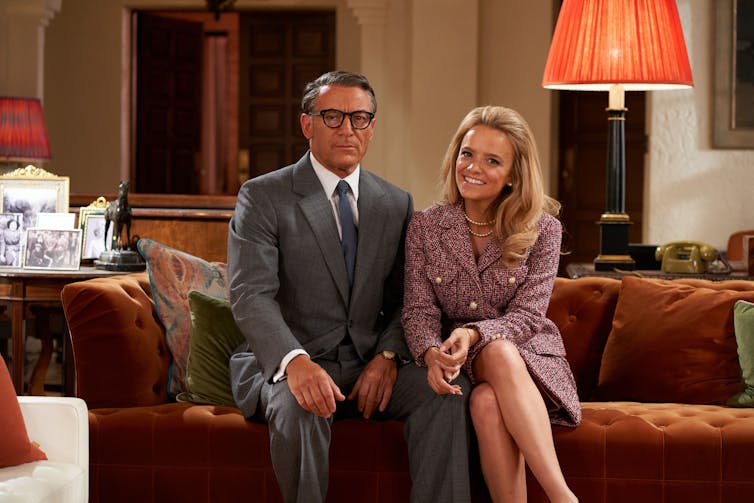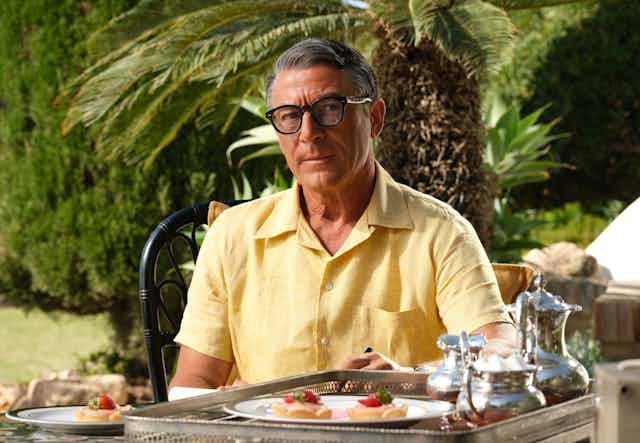Towards the end of Archie, a new four-part ITV drama about the life of Cary Grant, the actor (played at this stage by Jason Isaacs) muses: “Leave the past in the past where it belongs. If you’re not careful, it becomes a trap.” Yet the series suggests that, even at the height of his Hollywood fame, Grant could never truly forget his deprived origins in Bristol as a boy called Archibald Leach.
Archie doesn’t offer a linear account of Grant’s life, but instead cuts continuously between his humble English beginnings and later Hollywood success. There’s particular focus on the period during the early 1960s when he pursued, married and divorced the young screen star Dyan Cannon, who was 33 years his junior.
The remarkable transformation in Grant’s fortunes is evoked by details of colour and setting. Dull browns and greens predominate in the Bristol sequences, whereas the scenes set in California glow red, orange and yellow. The cramped backyard of Archie Leach’s childhood home gives way to the spacious garden of Cary Grant’s Los Angeles mansion, replete with swimming pool.
Yet the fluid composition of the drama suggests that, for Grant, there was no definitive break with his past. Young Archie, carrying memories of material and emotional deprivation in England, remained with him even as Grant lived a glamorous alternative life in the US.
Light and dark
Archie’s account of classic Hollywood is, at times, slight rather than probing. While we see Grant’s rechristening by a studio that believes his given name of Archie Leach “won’t cut it”, we seldom observe the workings of the promotional machinery that consolidated his star image.
Fleeting traces, rather than thick evidence, are provided of the “pin-ups, public appearances, studio handouts” and media interviews that were central to the manufacture of a mid-century movie star.
Yet Archie still represents a striking addition to the category of the film star biopic. In demystifying its charismatic subject, it observes genre norms: recall how stars are treated frankly by movies such as Chaplin (1992) and The Life and Death of Peter Sellers (2004). What is distinctive about this series, however, is that it shows the discomfort of a Hollywood icon usually taken to be the epitome of unruffled poise.

Film historian David Thomson argues that Grant’s screen presence was more complex than is often allowed. He could be “attractive and unattractive simultaneously”, radiating both “light” and “dark”. This sense of Grant’s duality, of sun and shadow coexisting, runs through Archie.
But the series does not look for Grant’s many sides in his film performances. Other than showing him with Mae West in She Done Him Wrong (1934), say, or with Audrey Hepburn in Charade (1963), Archie generally keeps away from Hollywood studios.
Nevertheless, in Isaacs’ fine performance as the older Grant, his charm is positioned as adjacent to his cruelty. The portrayal of his relationship with Cannon (Laura Aikman), especially, shows Grant exhibiting increasingly controlling behaviour.
The women in Grant’s life
The biopic is among the least generous of film genres – focusing attention upon an individual and depriving others who come into their orbit of oxygen. But Archie deviates from the norm, telling the stories of others besides Grant.
Cultural historian Michael Newton observes that stars in classic Hollywood rarely exist “as individuals”. Instead, they enter into pairings, living in “the realm of relatedness”. He has in mind such on-screen duos as Fred Astaire and Ginger Rogers.
Archie is uninterested in exploring film partnerships: Katharine Hepburn, with whom Grant made four movies, is absent here. As compensation, however, it brings into view two significant women in Grant’s off-screen life: Cannon and his mother, Elsie Leach (Harriet Walter).

The audience is discouraged from sharing Elsie’s withering assessment of Cannon as “a fluttery little thing”, with “no substance”. Instead, in Aikman’s spirited performance, Cannon is marked by pain and vulnerability as well as career aspiration. To a modest extent, the series becomes her biopic as well as Grant’s.
Grant’s relationship with his mother is also given significant screen time – though their dynamic is portrayed as a troubling one. Elsie was incarcerated in a psychiatric institution by her husband following the death of Grant’s young brother and spent 20 years there. Home movie-style footage of her dancing as an older woman with Grant could be showing romantic partners. When Grant tells her he is marrying Cannon, she sounds like another potential suitor in insisting: “I can make you happy.”
It would be wrong to overstate the darkness of Archie. Like its subject, the series is light on its feet and generates easygoing pleasure – and the mood brightens late on, as Grant becomes a parent for the first time. Nevertheless, in its bleaker sequences, the series powerfully shows the high price that Archie paid in becoming Cary Grant.

Looking for something good? Cut through the noise with a carefully curated selection of the latest releases, live events and exhibitions, straight to your inbox every fortnight, on Fridays. Sign up here.

